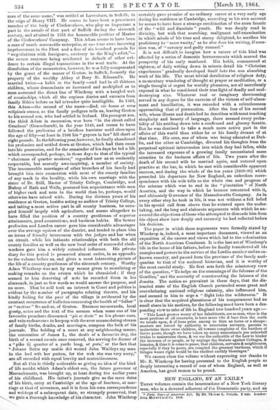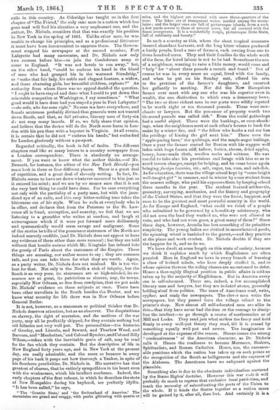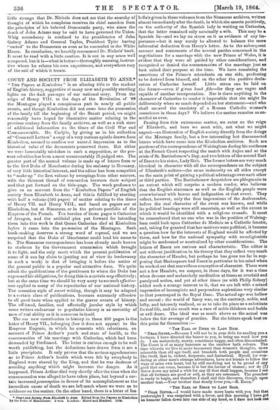NEW ENGLAND, BY AN EXILE.*
THESE volumes contain the lamentations of a New York literary man, who is a devoted adherent of the Democratic party, and an • Forty Pare of American gre. By Dr. Thnnae L. Nichols. 2 vols. London: John Maxwell and Co. 1804.
exile in this country. As Coleridge has taught us in the first chapter of "The Friend," the only sane man in a nation which has gone mad will find his situation a very unpleasant one, and the author, Dr. Nichols, considers that that was exactly his position in New York in the spring of 1861. Unlike other men, he was unable to change his principles, and as a professional litterateur it must have Wen inconvenient to suppress them. The Govern- ment stopped his newspaper at the second number, Fort Lafayette had many casemates, and Dr. Nichols saw only two courses before him—to join the Confederate army or come to England. "It was not heroic to run away," but, on the other hand, "could he embrue his hand in the blood of men who had grasped his in the warmest friendship," or " make that fair lady, his noble and elegant hostess, a widow, and those charming girls, her beautiful children, orphans ?" An authority from whom there was no appeal decided the question. " I ought to have stayed and done what I could to put down that miserable usurpation at Washington, I say sometimes." " What good would it have done had you stayed a year in Fort Lafayette? —she asks, who has some right." No man is a hero everywhere, and female acuteness probably divined that generals were not wanted down South, and that, as full privates, literary men of forty-six d ) not reap many laurels. If so, we fully share that opinion, and believe that the doctor will do the North more harm in Lon- don with his pen than with a bayonet in Virginia. At all events, it is certain that he did not " embrue his hands," but embarked for London gloriously without a passport.
Regarded critically, the book is full of faults. The different chapters read like so many letters to a country newspaper from a London correspondent. There is absolutely no arrange- ment. If you want to know what the author thinks,—of Mr. Bennett, for instance, the editor of the New York Herald—you must look in three or four different places. There is a great deal of repetition, and a great deal of slovenly writing. In fact, Dr. Nichols seems to have set down whatever occurred to him just as it entered his mind ; and we are by no means sure that it is not the very best thing he could have done. For be sees everything not only with the partiality of a party man, but with the jaun- diced eye of an exile, and this easy letter-writing tone takes the bitterness out of his style. When he rails at everybody who is in office, and declares that from the Potomac to the St. Law- rence all is fraud, corruption, and anarchy, we feel that we are listening to a grumbler who writes at random, and laugh at extravagance which if it were put forward more deliberately and systematically would seem savage and malignant. Some of the stories he tells of the prominent statesmen of the North are indeed scarcely credible, (and Dr. Nichols does not appear to have any evidence of them other than mere rumour) ; but they are told without that hostile animus which Mr. Kinglake has infused into the gossip of Paris about the statesmen of the Empire. These things are amusing, our author seems to say ; they are common talk, and you can take them for what they are worth. Again, as a party writer, Dr. Nichols does not mislead. He is too vio- lent for that. Not only is the North a sink of iniquity, but the South is so very pure, its statesmen are so high-minded, its re- sources are so great, its patriotism so sincere, nay, its towns, especially New Orleans, so free from rowdyism, that we put aside Dr. Nichols' evidence on these subjects at once. There have been other travellers in the South besides the Doctor, and we know what security for life there was in New Orleans before General Butler.
It is not, however, as a statesman or political thinker that Dr. Nichols deserves attention, but as an observer. The disquisitions on slavery, the right of secession, and the motives of the war party, may all be profitably skipped, for they contain nothing but old fallacies not very well put. The personalities—the histories of Greeley, and Lincoln, and Seward, and Thurlow Weed, and Barnum, and " Manhattan," and Colonel Rynders, and Colonel Billy Wilson,—taken with the inevitable grain of salt, may be read for the fun which they contain. But the description of life in New England forty years ago, and in New York at the present day, are really admirable, and the more so because in every page of his book it peeps out how thorough a Yankee, in spite of his Southern proclivities, Dr. Nichols is. His narrative has that greatest of charms, that be entirely sympathizes in his heart even with the weaknesses, which his intellect confesses. Indeed, the early chapters of the first volume, in which he describes the state of New Hampshire during his boyhood, are perfectly idyllic. "It has been called," he says,
"The 'Granite State,' and 'the Switzerland of America.' The mountains are grand and craggy, with peaks glittering with quartz or
mica, and the highest are covered with snow three-quarters of the year. The lakes are of transparent water, nestled among the moun- tains ; and the larger ones are full of picturesque islands, from a rock a few yards across to those of several acres, but all covered with the finest evergreens. It is a wonderfully rough, picturesque little State, full of sublimity and beauty."
In such a country as this, where the short tropical summers insured abundant harvests, and the long bitter winters produced a hardy people, lived a race of farmers, each owning from one to three hundred acres. They and their families do the whole work of the farm, for hired labour is not to he had. Sometimes the son of a neighbour, wanting to raise a little money, would come and " help " for " about three pounds a month and found." But of course he was in every sense an equal, lived with the family, and when he put on his Sunday suit, offered his arm to the prettiest of the farmer's daughters, and escorted her gallantly to meeting. Nor did the New Hampshire farmer ever meet with any one who was his superior even in wealth, the one distinction to which even a democracy bows. "The two or three richest men in our parts were wildly reputed to be worth eight or ten thousand pounds. These were mer- chants or lawyers. But the possessor of property worth two thousand pounds was called rich." Even the social gatherings had a useful object. There were the huskings, or corn-shuck- ings, when the neighbours meet at each other's houses to husk the maize by a winter fire, and " the fellow who husks a red ear has the privilege of kissing the girl next him." There were the "apple-paring bees," the quiltings, and the maple-sugar boilings. Once a year the farmer started for Boston with his waggon well laden with hogs frozen stiff, tallow, butter, cheese, dried apples, honey, home-made cloth, woollen socks and mittens. He was careful to take also his provisions and forage with him so as to avoid tavern charges, except for lodging, and he came home again bringing foreign luxuries, viz., salt, sugar, tea, rum, and salt-fish. As for education, there was the village school kept by "some bright well-taught girl " in summer, and in winter by some student from the nearest college, who paid his expenses there by keeping school three months in the year. The student learned arithmetic, geometry, surveying, mechanics, and the history and geography of the United States, and that they were the freest, happiest, and soon to be the greatest and most powerful country in the world. As for Europe and England, ''what could we think of a people who submitted to be governed by a hereditary aristocracy, who did not own the land they worked on, who were not allowed to vote, and who had not even guns, a great many of them?" Since these days, however, Arcadia has lost something of its primitive simplicity. The young ladies are clothed in manufactured goods, the spinning wheel is banished to the garret,—and they practice at the piano and work crochet. Dr. Nichols doubts if they are the happier for it, and so do we.
We have dwelt at some length on this state of society, because we think it explains much by which Englishmen are often puzzled. Here in England we have in every branch of learning a class of trained minds, who have deeply studied it, and to whose opinion thereon the ruling classes are accustomed to defer. Hence a thoroughly illogical position in public affairs is seldom taken up by the majority of Englishmen. But in America every one is self-educated. There are, indeed, a few accomplished literary men and lawyers, but they are isolated atoms, generally holding aloof from politics. The mass of Americans read, write, cypher, and study the newspapers. The clever men write the newspapers, but they passed from the village school to the printer's shop. Now almost all self-educated men are alike in this—that they have never had the time or the courage to discip- line the intellect—to go through a course of mathematics or of Mill and Locke. They read just what strikes the fancy and hold firmly to every well-put theory they read, till it is erased by something equally well put and newer. The imagination is developed at the expense of the reason. Hence comes the strong " credensiveness " of the American character, as Dr. Nichols calls it. Hence the readiness to become Mormons, Shakers, Spiritualists, and Roman Catholics. Hence, too, the unreason- able positions which the nation has taken up on such points as the recognition of the South as belligerents and the captures of the Alabama. The Americans have no safeguard against the plausible. Something also is due to the obstinate individualism nurtured
by the States Rights' doctrine. However this war ends it will probably do much to repress that exclusive local patriotism, and teach the necessity of subordinating the parts of the Union to the whole. If it binds the States together as a nation more will he gained by it, after all, than lost. And certainly it is a little strange that Dr. Nichols does not see that the anarchy of thought of which he complains receives its chief sanction from the principles of his beloved Democratic party, who since the death of John Adams may be said to have governed the Union. Whig ascendancy is confined to the presidencies of John Quincy Adams and General Taylor, President Tyler baying "ratted" to the Democrats as soon as he succeeded to the White House. In conclusion, we heartily recommend Dr. Nichols' book. It must be read with a little caution. It is not in any sense well composed, but it is—what is better—thoroughly amusing, instruc- tive where he relates his own experiences, and everywhere racy of the soil of which it treats.




































 Previous page
Previous page